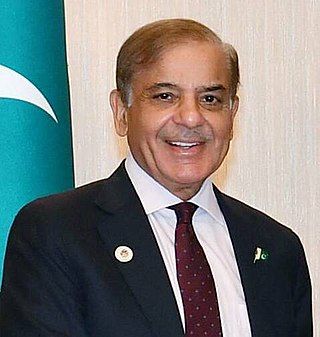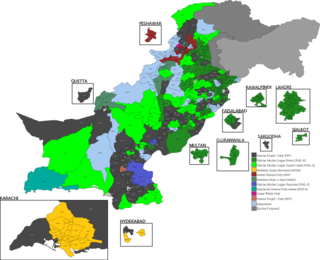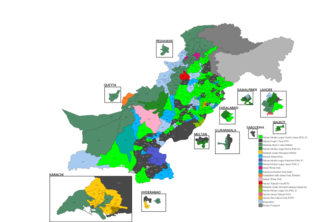
Mian Manzoor Ahmad Wattoo is a Pakistani politician. Wattoo was first elected, in 1985, the Speaker of Provincial Assembly of the Punjab, which, by population, is the largest province of Pakistan. Thrice elected for the same office, he secured the office of the Chief Minister of Punjab, Pakistan in 1993 on the ticket of Pakistan Muslim League (J), after a series of tug of war between the federal and provincial government Wattoo twice had to leave office between his term only to leave office permanently on 16 November 1996.

The Pakistan Muslim League (Nawaz) (Urdu: پاکستان مسلم لیگ (ن), abbr.PML(N) or PML-N) is a centre-right, conservative liberal political party in Pakistan. It is currently the third-largest party in the Senate. The party was founded in 1993, when a number of prominent conservative politicians in the country joined hands after the dissolution of Islamic Democratic Alliance, under the leadership of former Prime Minister Nawaz Sharif. The party's platform is generally conservative, which involves supporting free markets, deregulation, lower taxes and private ownership. Although the party historically supported social conservatism, in recent years, the party's political ideology and platform has become more liberal on social and cultural issues; however, members have been accused of using Islamist populist rhetoric. Alongside the Pakistan Tehreek-e-Insaf (PTI) and Pakistan People's Party (PPP), it is one of the three major political parties of the country.

Since its establishment in 1947, Pakistan has had a non-symmetric federal government and is a federal parliamentary democratic republic. At the national level, the people of Pakistan elect a bicameral legislature, the Parliament of Pakistan. The parliament consists of a lower house called the National Assembly, which is elected directly, and an upper house called the Senate, whose members are chosen by elected provincial legislators. The head of government, the Prime Minister, is elected by the majority members of the National Assembly and the head of state, the President, is elected by the Electoral College, which consists of both houses of Parliament together with the four provincial assemblies. In addition to the national parliament and the provincial assemblies, Pakistan also has more than five thousand elected local governments.

Mian Muhammad Shehbaz Sharif is a Pakistani politician and businessman who is currently serving as the 24th prime minister of Pakistan since March 2024, having previously served in the post from April 2022 to August 2023. He is the president of the Pakistan Muslim League (N) (PML-N). Previously in his political career, he served as the chief minister of Punjab three times, making him the longest-serving chief minister of Punjab.

General elections were held in Pakistan on 18 February 2008 to elect members of the 13th National Assembly and the four Provincial Assemblies.

General elections were held in Pakistan on 10 October 2002 to elect the 12th National Assembly and four Provincial Assemblies. The elections were held under the military government of Pervez Musharraf. The two mainstream parties, Pakistan Peoples Party (PPP) and Pakistan Muslim League (N) (PML-N) had several restrictions imposed on them and their leaders Benazir Bhutto and Nawaz Sharif were in exile. In order to address the restrictions, PPP created the Pakistan Peoples Party Parliamentarians (PPPP) under the leadership of Ameen Faheem, to contest the elections on its behalf. The PML-N meanwhile, suffering from the party's division into two factions: one that remained loyal to Sharif and were contesting the elections under the leadership of Javed Hashmi, and the other which had broken away to form the pro-Musharraf Pakistan Muslim League (Q) (PML-Q) under the leadership of Mian Muhammad Azhar. The emergence of the PML-Q marked the beginning of multi-party politics in the country, bringing an end to the decade-long two-party system between the PPP and PML-N.

The National People's Party (NPP) was a political party located in Pakistan. It was founded in 1986 by Ghulam Mustafa Jatoi after he had a disagreement with Benazir Bhutto, subsequently leaving the Pakistan Peoples Party.
Bhurban Accord was a political agreement signed by two of Pakistan's biggest political powers, the Pakistan Peoples Party (PPP) and the Pakistan Muslim League (Nawaz) (PML-N) and was signed by co-chairman of the PPP Asif Ali Zardari and PML-N leader Nawaz Sharif it was signed on 8 March 2008 in PC Bhurban in the province of Punjab.

An indirect presidential election was held on 6 September 2008 in Pakistan. The Electoral College of Pakistan – a joint sitting of the Senate, National Assembly and Provincial Assemblies – elected a new president after the resignation of President Pervez Musharraf. As required by the constitution, Muhammad Mian Soomro automatically became acting president on 18 August 2008, upon the resignation of Musharraf. The constitution required that a new president be elected by Parliament within 30 days; Soomro was considered loyal to Musharraf, and it was considered certain that he would be replaced in that election.

General elections were held in Pakistan on 3 February 1997 to elect the members of National Assembly. The elections were a fierce contest between Pakistan Peoples Party (PPP) led by pre-election Prime Minister Benazir Bhutto and the Pakistan Muslim League (N) led by Nawaz Sharif. Unlike the 1990 elections where Sharif won due to allegations of rigging, this time he benefited from the controversial death of Bhutto's brother Murtaza, a populist leader, a worsening economy, and alleged corruption cases against Bhutto's husband Asif Ali Zardari.

General elections were held in Pakistan on 25 July 2018 to elect the members of the 15th National Assembly and the four Provincial Assemblies. The three major parties were Pakistan Tehreek-e-Insaf (PTI), led by Imran Khan, the Pakistan Muslim League, led by Shehbaz Sharif, and the Pakistan People's Party, led by Bilawal Bhutto. The PTI won the most seats in the National Assembly but fell short of a majority; the party subsequently formed a coalition government with several smaller parties. At the provincial level, the PTI remained the largest party in Khyber Pakhtunkhwa (KP); the Pakistan Peoples Party (PPP) retained its dominance in Sindh; and the newly formed Balochistan Awami Party (BAP) emerged as the largest party in Balochistan. In Punjab, the result was a hung parliament, with the Pakistan Muslim League (N) winning the most seats. However, after several independent MPAs joined the PTI, the latter became the largest party and was able to form a government.

Senate elections were held in Pakistan on 5 March 2015 to elect the replacements for 52 retiring senators. Those retiring include chairman Nayyar Hussain Bukhari and deputy chairman Sabir Ali Baloch of the upper house. Pakistan Peoples Party (PPP), the majority party in Senate, would lose 21 members, followed by Pakistan Muslim League Nawaz would lose 9 and Awami National Party would lose 6 members.

Presidential elections were held in Pakistan on 4 September 2018. The elections saw Arif Alvi of PTI being elected as the 13th president of Pakistan after defeating Fazal-ur-Rehman of MMA and Aitzaz Ahsan of PPP. Although incumbent president Mamnoon Hussain, whose term was to expire on 9 September 2018, was eligible for re-election, he declined to take part.

Provincial elections were held in the Pakistani province of Khyber Pakhtunkhwa to elect the members of the 10th Provincial Assembly of Khyber Pakhtunkhwa on 11 May 2013, alongside nationwide general elections and three other provincial elections in Sindh, Balochistan and Punjab. The remaining two territories of Pakistan, AJK and Gilgit-Baltistan, were ineligible to vote due to their disputed status.

Provincial elections were held in the Pakistani province of Punjab to elect the 16th Provincial Assembly of the Punjab on 11 May 2013, alongside nationwide general elections and three other provincial elections in Sindh, Balochistan and Khyber Pakhtunkhwa. The remaining two territories of Pakistan, AJK and Gilgit-Baltistan, were ineligible to vote due to their disputed status.

Provincial elections were held in the Pakistani province of Punjab on to elect the members of the 17th Provincial Assembly of the Punjab on 25 July 2018, alongside nationwide general elections and three other provincial elections in Sindh, Balochistan and Khyber Pakhtunkhwa. The remaining two territories of Pakistan, AJK and Gilgit-Baltistan, were ineligible to vote due to their disputed status.

Provincial elections were held in the Pakistani province of Punjab to elect the 14th Provincial Assembly of the Punjab on 10 October 2002, alongside nationwide general elections and three other provincial elections in Sindh, Balochistan and North-West Frontier Province. The remaining two territories of Pakistan, AJK and Gilgit-Baltistan, were ineligible to vote due to their disputed status. The elections were held under the military government of General Pervez Musharraf. The elections saw an end to the two-party system between the Pakistan Peoples Party and the Pakistan Muslim League (N), with the centre-right Pakistan Muslim League (Q) emerging as a third main party supporting Musharraf.

Provincial elections were held in the North-West Frontier Province to elect the members of the 9th Provincial Assembly of North-West Frontier Province on 18 February 2008, alongside nationwide general elections and three other provincial elections in Sindh, Balochistan, and Punjab. The remaining two territories of Pakistan, AJK and Gilgit-Baltistan, were ineligible to vote due to their disputed status. These were the last elections held under the provincial name "North-West Frontier Province", later changed to Khyber Pakhtunkhwa following the Eighteenth Amendment to the Constitution of Pakistan.

Provincial elections were held in Balochistan on 8 February 2024 to elect a new provincial legislature. On 5 August 2023, after the approval of the results of the 2023 digital census by the Council of Common Interests headed by Prime Minister Shehbaz Sharif, elections have been delayed for several months, as new delimitations will be published on 14 December 2023. On 2 November 2023, the Election Commission of Pakistan announced, in agreement with the President of Pakistan, Arif Alvi, that the elections will be held on 8 February 2024. This election will be held concurrently with nationwide general elections and other provincial elections.





















